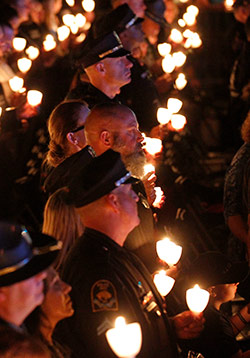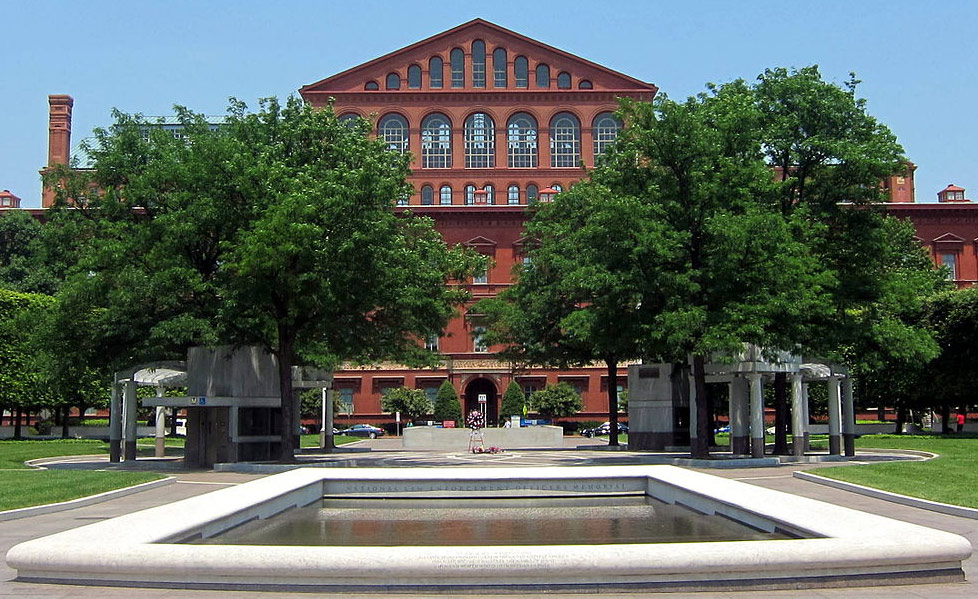Contact Us
To provide feedback on the Community Policing Dispatch, e-mail the editorial board at CPDispatch@usdoj.gov.
To obtain details on COPS Office programs, publications, and resources, contact the COPS Office Response Center at 800-421-6770 or AskCopsRC@usdoj.gov

U.S. Department of Justice
Office of Community Oriented Policing Services
Washington, DC 20530
This month, tens of thousands of law enforcement professionals from agencies throughout the United States and the world will meet in Washington, D.C. to honor those who have fallen in the line of duty. The celebration of Police Week as we know it today was first established by a 1962 presidential proclamation designating May 15 as Peace Officers Memorial Day. In 1982, the Grand Lodge of the Fraternal Order of Police held the first National Peace Officers’ Memorial Service in Senate Park. Today, that Memorial Service has become an annual ceremony addressed by the President of the United States and attended by members of the U.S. Congress. Its observance has expanded from a small gathering of 120 friends and survivors of fallen officers into a multiday celebration to acknowledge the service and sacrifice of law enforcement officers. This year’s Police Week will officially take place from May 12–18, with additional events such as the Blue Mass at Saint Patrick’s Catholic Church taking place earlier in May.
 Along with other members of the COPS Office, I have participated in many Police Week events over the years. This year, these will include the National Peace Officers Memorial Service, the laying of a wreath at the National Law Enforcement Officers memorial wall, and a candlelight vigil on the National Mall, as well as 5K run and a variety of meetings in which law enforcement professionals, government officials, survivors, and supporters share concerns and experiences.
Along with other members of the COPS Office, I have participated in many Police Week events over the years. This year, these will include the National Peace Officers Memorial Service, the laying of a wreath at the National Law Enforcement Officers memorial wall, and a candlelight vigil on the National Mall, as well as 5K run and a variety of meetings in which law enforcement professionals, government officials, survivors, and supporters share concerns and experiences.
Police Week is a unique, sacred, and very moving event, honoring the valor of federal, state, tribal, and local officers who have sacrificed their lives for the public good. And in the midst of negative media reporting, it serves as a reminder that the overwhelming majority of law enforcement professionals are motivated by a desire to serve, and that they work selflessly to protect the safety, security, and well-being of all citizens and visitors alike These brave men and women are the people who respond to domestic violence calls, break up illegal drug rings, chase down murderers, and enter the deadly chaos of active shooter scenes to save lives. But they do much more than arrest bad guys and keep the peace.
They also perform acts of kindness and service in their communities day in and day out, providing guidance to young people who’ve gotten onto the wrong track, buying Christmas gifts for kids who wouldn’t have any otherwise, helping the homeless, the elderly—any and all who need assistance and support. Law enforcement today serves as the last stop on the “social conveyor belt,” and when other institutions fail, members of law enforcement respond to meet the need. From homelessness and mental health to epidemic levels of illegal drug overdoses, law enforcement professionals are constantly filling the gaps, often with no or limited resources.
We must keep in mind that their deaths are not only a terrible loss for their departments and communities, but for their survivors too. Each fallen officer was someone’s child, parent, spouse, sibling, and friend. During Police week, participants acknowledge their sacrifice as well.
Though we can never repay the debt we owe to the 21,183 law enforcement officers whose names are etched on the memorial wall, we can keep their memory bright by acknowledging the service of their fellow officers who are still on the front lines of public and national security, dedicated to making our nation and communities safe. What’s more, we can—and should—do it every week of the year.
 To learn more about the challenges and accomplishments of our men and women in blue, I highly recommend a visit to the National Law Enforcement Museum in Washington D.C., which opened this year. You can experience the life of a law enforcement professional in this stunning new building close to the National Mall—walk in their shoes, hear their stories, and learn the history of American policing. It contains an interesting collection of memorabilia and law enforcement tools, along with interactive activities sure to entertain all ages.
To learn more about the challenges and accomplishments of our men and women in blue, I highly recommend a visit to the National Law Enforcement Museum in Washington D.C., which opened this year. You can experience the life of a law enforcement professional in this stunning new building close to the National Mall—walk in their shoes, hear their stories, and learn the history of American policing. It contains an interesting collection of memorabilia and law enforcement tools, along with interactive activities sure to entertain all ages.
Most importantly, the museum helps visitors understand the role of law enforcement in our society, its procedures, practices, and purpose. And by understanding why they do what they do and the dangers they face in their work, we can fully appreciate the service of our men and women in blue.
– Director Keith
Subscribe to Email Updates
To sign up for monthly updates or to access your subscriber preferences, please enter your email address in the Subscribe box.






